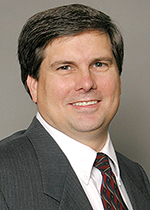Shots rang out just down the hall. Louder than I ever thought. The crisp “pops” were growing closer. The gunman was moving toward us! Would we be his next victims?
Fortunately, it was only a drill. The shooter was using blanks, not bullets, and he didn’t want to harm us—only help us to be prepared. Workshops, like this one offered by Triple Counter Measures, are sadly necessary as horrific scenes of violence seemingly have become a “new normal” in our society.
Just this past week, three persons were killed and 11 injured in a mass shooting at a Madden NFL video game tournament at a pizza restaurant in downtown Jacksonville, Fla. The shooting followed the killing of one person and injury of two others at a Friday night high school football game just a few miles away.
No place seems safe anymore. Schools, malls, concerts, factories, businesses, homes and hospitals have all been sites of mass shootings. Even churches aren’t exempt. Pointing to Luke 4:33, Michael Webb, who led the KBC’s security workshop last week, asserted, “If a demon can be in a synagogue then, evil can be in the church now.”

Dr. Todd Deaton
Editor
And, it can strike quickly, without warning, he observed, noting that 37 percent of these shootings happened in 5 or less minutes, and 43 percent were over before the police arrived. Urging churches to heed the instructions in 1 Peter 5:8 to be alert and vigilant, Webb, a Kentucky State Police officer and a Christian, said his calling is to “do everything I can to protect His sheep—the people who are worshipping.”
“Because active shooter situations are often over within 12 minutes, well before law enforcement arrives on the scene, individuals must be prepared both mentally and physically to deal with an active shooter situation,” Webb told KBC employees. “Don’t subscribe to the mindset that this won’t affect me,” he urged. “It can happen in Kentucky; it can happen in churches.”
Here are some suggestions that Webb shared with our KBC staff, which we now pass along to our readers in the hopes that they may save lives in our churches should the unthinkable happen.
“Quickly determine the most reasonable way to protect your own life,” Webb instructed. “You have three main courses of action: RUN, HIDE, or FIGHT.”
While this may seem obvious, some inevitably will panic, become confused, hysterical, paralyzed by fear. So it’s important to already have an escape route and plan in mind. Try to help others escape, if possible, but evacuate the premises regardless of whether they follow you.
If you can’t leave, hide. Get out of the shooter’s sight, and seek protection in case shots are fired in your direction. Lock the door to the room, blockade the door with heavy furniture, and crouch behind a desk or cabinet.
Only as a last resort should you attempt to take the active shooter down. If the shooter is at close range and you cannot flee, your chance of survival is much greater if you try to incapacitate him by throwing items and improvising weapons.
Of course, whenever possible, call 911 to alert police and first responders to the active shooter’s location. Law enforcement’s primary objective is to stop the shooter as soon as possible, Webb said. The first officers to arrive on the scene will not stop to help injured persons, but emergency medical personnel will arrive quickly to treat and remove them.
The biggest takeaway from the workshop, however, was for churches and individuals to “be wise as serpents and harmless as doves” (Matthew 10:16). Stay aware to the potential dangers we may confront, while seeking to counter evil with the love of the Savior. Indeed, the antidote to anger and hate is love.
Todd Deaton